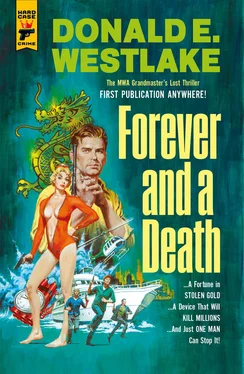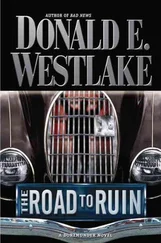If I tell him no tomorrow, I’ve thought it over, and I don’t want to stay here, beautiful and restful though Kennison might be, what then? Will he just allow me to leave, like that? Unlikely. If I don’t give him my parole, what else would he do but simply make me a prisoner?
What was it that Curtis was going to attempt, sometime in the next ten days or two weeks? If Manville did nothing about it, would he regret that? Would people be hurt, or even killed? What is Richard Curtis up to?
Should he try to escape tonight? Assuming the door to his room was left unlocked, should he try to get out of here? It was impossible to believe they would have left any of the vehicles where he could get at them, but even if they did, which way would he drive? The road into here was barely a track in the dirt, difficult enough for Curtis’s own chauffeur to find at night, and constantly blocked by stray cattle. Kennison was who knew how many thousands of acres in size. There was no way to get off it tonight.
Tomorrow? Were Pallifer and the other two still around? Manville for a giddy second visualized Albert Farrelly teaching him to ride a horse and then, magically, Manville atop the horse, racing over the downs to freedom.
He left the dining room, and started down the empty hall toward his room. Curtis had been ingratiating tonight, persuasive, reasonable, plausible; but Manville wanted none of it. He wanted nothing but to leave this place. For now, he entered the small neat guestroom and shut the door. Richard Curtis is at his most dangerous, he thought, when he seems the most sane.
Jerry was amazed and delighted at how seriously the police were taking their story, which they’d now told three times. The first time was to a detective in the police station where he and Luther and Kim had gone to report the disappearance of George Manville, the second was to his superior at the same station, and now the third time was to an extremely senior inspector in his office here in police headquarters.
The inspector was a very tall, large-framed tweedy man with thick gray brushlike hair and astonishingly dainty granny glasses perched on his hawk nose. His name, he said, was Tony Fairchild, which seemed too diminutive for such a large man, and as he listened he made many notes on a legal pad on his desk in tiny crabbed writing that surely no one else would ever be able to read.
Other plainclothes detectives were in and out of the small but sunny office, going on mysterious errands at nods and hand gestures from Fairchild, returning with equally mysterious nods or headshakes of their own. Sometimes they returned with small slips of paper, which they put on his desk and at which he barely glanced.
Saturday morning. Before breakfast, Kim had come to their room, where she’d phoned the motel in Surfers Paradise, to be told that George Manville had not as yet returned. After breakfast at the hotel, she’d led them to the parking lot where the red car was still where Manville had left it. So then they’d gone to the police.
By now, it was nearly eleven o’clock, and Jerry was beginning to feel talked out. Kim had described the events on the ship at length, Jerry and Luther had described their own activities, Kim’s parents’ whereabouts in Sydney were given, the parents’ unprofitable meeting with Captain Zhang related, Jerry and Luther’s own encounter with Zhang told, and finally the disappearance of George Manville.
Oddly, Fairchild seemed for a while most interested in Captain Zhang, wanting to know every detail of the encounter between him and Jerry and Luther, asking if they’d been in Zhang’s hotel room for even a second. “I would have,” Jerry told him, “I’d have gone right on in and insisted he tell us the truth, but Luther wouldn’t let me.”
“Hard to know if that would have made a difference,” Fairchild said, and at last left that issue to say to Kim, “The lawyer Manville was going to see. His office was in the Mansions in George Street?”
“I think so,” Kim said. “I think that’s what he said.”
“And he told you the name, but you don’t remember it.”
“I’m sorry,” Kim said. “I didn’t know I was going to have to.”
“Of course not,” Fairchild agreed. He was managing to be both remote and sympathetic at the same time. “There aren’t that many lawyers in the Mansions,” he said. “Was it a European name or an Asian name, do you remember?”
“It sounded European, I think,” she said, “but it wasn’t anything ordinary.”
Fairchild brooded, gazing at the far wall over his granny glasses, then he frowned at Kim and said, “Just a minute. You say Manville got to this lawyer through a friend in America.”
“An architect in Houston, he said. I’m sorry, I don’t know his name either.”
“Building trades,” Fairchild said. “Manville is in that line, his Houston friend is, he would have sent him on to someone in the same sort of line here, so it’s a lawyer who represents architects or developers or— Would the name be Andre Brevizin?”
“Yes!” Kim said, delighted. “That’s what he said. I remember it sounded like too nice a name for a lawyer.”
Fairchild laughed. “I expect we have areas of agreement, Miss Baldur,” he said. “Although I doubted it at first, when I heard the story you wished to tell.”
“Richard Curtis, you mean,” she said.
Fairchild nodded. “Among other things. But let us look at what I began with. Two days ago, in this city, your Mr. Curtis brought a complaint to the police — not to me, I’m sorry to say, I wish I’d met the man, considering subsequent events — a complaint charging a former employee, one George Manville, with industrial espionage and theft. I’ve had a looksee at the complaint itself, and he did seem to have sufficient evidence for the charge.”
Jerry wanted to break in here with a ringing denunciation of Richard Curtis as a polluter and a well-known liar, but he restrained himself.
“Now this morning,” Fairchild went on, “an unknown young American lady, yourself, with no identification but claiming a friendly relationship with the same George Manville, presents herself to the police with a wild story of kidnapping, piracy, attempted murder and the suspicious disappearance of the man Manville himself, all pointing to Richard Curtis as the villain. I must admit. Miss Baldur, at first blush you did not bring us anything we could be expected to take seriously.”
“But you do take it seriously,” Kim said. “I can see you take it seriously.”
“For one reason only,” Fairchild told her. “It is why you were brought to this office, and not dealt with rather summarily at a lower level.”
Kim, looking uncertain, possibly a little afraid, so that Jerry had the urge to grasp her hand but again restrained himself, said, “Why is that?”
Fairchild lowered his head enough to look at them all, one at a time, over his granny glasses. Jerry had to force himself to meet that steady look. “I take it,” Fairchild said, “none of you has had any dealings with Captain Zhang Yung-tsien since your unsatisfactory interview with him yesterday.”
Jerry felt heat rising in his cheeks. Had Zhang dared to put in his own complaint? He said, more hotly than he’d intended, “Inspector, if Captain Zhang suggests we—”
Fairchild stopped him with an upraised hand. “Not at all,” he said. “Captain Zhang went out his hotel room window yesterday afternoon, very near to the time you and Mr. Rickendorf spoke with him.”
Jerry could only stare, open-mouthed. His first reaction was: I did it! I pressed him too hard, I forced him, I should have found a better way, a quieter way... “Oh God. What have I done?” He covered his face with his hands.
Читать дальше







![Дональд Уэстлейк - Enough [A Travesty (novel) and Ordo (novelette)]](/books/416846/donald-uestlejk-enough-a-travesty-novel-and-or-thumb.webp)
